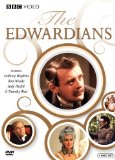| Reviews & Columns |
|
Reviews DVD TV on DVD Blu-ray 4K UHD International DVDs In Theaters Reviews by Studio Video Games Features Collector Series DVDs Easter Egg Database Interviews DVD Talk Radio Feature Articles Columns Anime Talk DVD Savant Horror DVDs The M.O.D. Squad Art House HD Talk Silent DVD
|
DVD Talk Forum |
|
|
| Resources |
|
DVD Price Search Customer Service #'s RCE Info Links |
|
Columns
|
|
|
Edwardians, The
BBC Video and 2 Entertain have released The Edwardians, an eight-part British miniseries from 1972 that looks at nine influential personalities from that Belle Epoque "way-station" period in British history, the Edwardian Era, which fell between the advancements and glories of the Victorian Age, and the utter destruction wreaked by the First World War. The people chronicled in the 70 minutes-long episodes of The Edwardians include Charles Rolls and Frederick Royce, Horatio Bottomley, E. Nesbit, Sir Arthur Conan Doyle, Robert Baden-Powell, Marie Lloyd (and other greats from Britain's classic "music hall" days), Daisy Greville, and David Lloyd George. Whether or not one finds these characters truly representative of the Edwardian Era would depend, I suppose, on whether or not you have a PhD in English History, but for the casual history buff - as well as for admirers of vintage British TV drama - The Edwardians is an interesting collection of mini-dramas. Let's look briefly at the individual episodes.
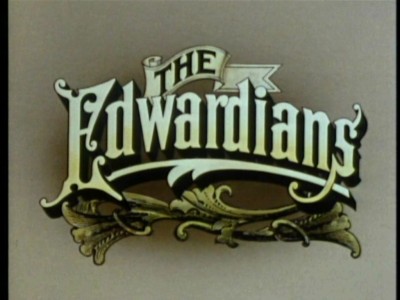
MR. ROLLS AND MR. ROYCE
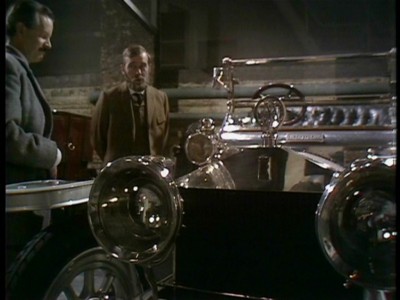
Written by Ian Curteis and directed by Gerald Blake, both British TV veterans, Mr. Rolls and Mr. Royce is a spirited look at the two conflicting personalities that came together to create the single finest name in automobile engineering in the world. Beginning with Frederick Royce's (Michael Jayston) overwhelming obsession with designing a motorcar engine that was quiet, fast and reliable, the film quickly joins Royce up with the aristocratic Rolls (Robert Powell), whose name and bank balance ensures Royce's mania for getting even the smallest detail correct, will continue. The relationship is "love/hate" on the best of days, with Royce fixated on perfecting a "perfect" automobile, while Rolls, interested in achieving that goal, as well, is consumed with other pursuits such as balloon and auto racing.
Jayston, always a little stiff, is perfect as the passionate, preoccupied Royce (I love it when he hands out the pay packets to his workers, intoning contemptuously after each dispersal, "You don't deserve it."), while Powell is obviously having fun as the flamboyant Rolls (he has a great moment, after winning an important car race that helped establish Rolls-Royce as a force within the automobile field, when he rather wistfully acknowledges the end of his automobile fancies: "Well...that's cars."). The film is surprisingly dense with biographical detail on the two characters, which have been woven artfully into the narrative; it may only be a little over an hour long, but the characters are fully rounded. It's a great start to The Edwardians, representing a small slice of the history of the technological advances that marked the Edwardian Age, and one of the more successful entries in the series.
HORATIO BOTTOMLEY
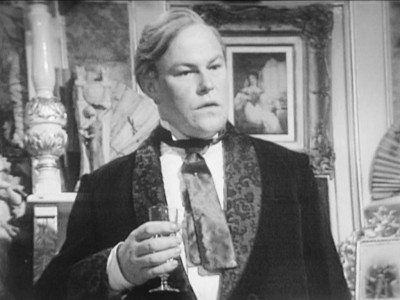
Sporting a commanding performance by Timothy West, Horatio Bottomley careens through the various outrageous scams and financial finagles of one of the most colorful swindlers (as well as writers and orators) of the 20th century, Horatio Bottomley. Written by the prolific Julian Bond (The Shooting Party, The Whistle Blower), Horatio Bottomley begins with one of Bottomley's seemingly endless trials (for fraud involving two of his many shady corporations), with Bottomley in the dock, charming not only the jury but the judge, as well, going so far as to invite the judge, after his acquittal, to head up a new risky business venture. Living his life always on the very edge of either total victory over his creditors and debtors, or inevitable bankruptcy, what comes through Horatio Bottomley is a portrayal of an enormously charismatic, charming individual who garnered praise even from the people he swindled, but who ultimately wasted his life, misjudging the public's infinite patience with his naughty, fraudulent ways. Not that Bottomley seemed to care for this condemnation; in fact, he seems to have thrived on it.
But Bond's screenplay (with Alan Clarke's quick direction) leaves no room for doubt that Bottomley's end was indeed a pathetic one (living out his final years in prison, and then touring in third-rate musical halls, delivering speeches to handfuls of people when previously he roused the entire nation with his oratory). The man who was responsible for the formation of the enormously successful and influential magazine John Bull and the Financial Times newspaper, a man who rose from an orphanage to become a Member of Parliament, and a man who spent as much time pursuing drink, sport and women as he did pursuing ill-gotten gains, eventually wound up a broken, forgotten, penniless man. He is a particularly Edwardian character (when the sands below Britain's rigid class system were just starting to shift), and this little comedy/drama is probably the best offering here on The Edwardians - due in no small part to Timothy West's outsized, energetic performance.
E. NESBIT
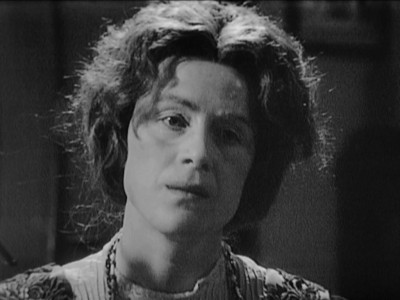
E. Nesbit looks at the world-famous British children's author through a decidedly more adult viewpoint; specifically, the film examines her "open" marriage to Hubert Bland (James Villiers), who lived with Nesbit (Judy Parfitt) and the mother of two of his children, Alice "Mouse" Houston (Jane Lapotaire). Beginning with the death of her newborn baby, the story then looks at how Bland, after being caught with Houston at Nesbit's home (Houston was brought in earlier as a combination secretary/housemaid), negotiates a ménage with Edith on the grounds that he must have multiple women in his life, and that he and Edith need to be "brave" and "new," unlike the vast bourgeois out there who cling to outdated monogamy. Soon, Edith as well is having affairs (although not shown here, just alluded to in the exposition) with literary figures such as George Bernard Shaw. But the devastating pain of losing her son 15-year-old son Fabian (Simon Turner) sets into motion a painful night of discovery as Rosamund Bland (Rosalyn Landor), raised by Edith as her own daughter, discovers she and Paul Bland (Michael Menaugh) are really Houston's offspring.
E. Nesbit, directed by James Cellan Jones with a screenplay by Ken Taylor, is a relentlessly depressing exploration of the author that can be hard to take at times - not only because the main personalities are largely unsympathetic to begin with, but the arch tone of the writing and performing can be off-putting, as well. Parfitt and Villiers do little to endear us to these selfish, unlikeable people (the Hubert character is particularly odious in his self-satisfied, smug assertion of his infidelity), which robs the viewer of any empathy for Edith when she suffers a true tragedy and loses her beloved son Fabian. Not a particularly successful entry in The Edwardians miniseries.
CONAN DOYLE
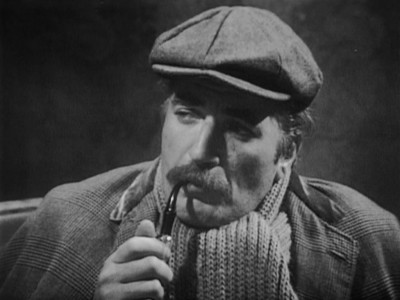
Conan Doyle looks at the true-life detective case orchestrated by the creator of Sherlock Holmes, Sir Arthur Conan Doyle, when he was engaged to clear the name of George Edalji, an Indian/Scottish solicitor who was convicted of a series of brutal horse slashings right after the turn of the century. Edalji, a brilliant law student, and his family had been the subject of poison pen letters for years before the horse maimings, letters which were used by the police to jail and then later convict Edalji unlawfully. Doyle, a passionate advocate for blind justice, recognized that prejudice against Edalji was the powerful motivator for the police to shore up the case's admittedly flimsy physical evidence. Doyle, operating very much like his own world famous creation, Holmes, methodically researched the case and after eight months, was able to convince the courts to rescind Edalji's conviction (although the Crown made no attempt to compensate the innocent man). Doyle's efforts, which were widely covered in the press, helped establish the Criminal Appeals Court in England.
Conan Doyle is fascinating not only because it's tightly scripted and directed by pros Jeremy Paul (Lovejoy, Upstairs, Downstairs) and Brian Farnham (Agatha Christie: Poirot, Rosemary & Thyme), delivering up a worthy little Holmesian mystery, but more so because we see the mind of the author, Doyle, working exactly like his fictional alter ego. Frequently, readers of mystery stories often muse about how an author actually comes up with a murder plot, and how one works out all the convolutions of the story. This true incident, as complicated and tricky as any case Holmes tackled, is remarkable because we see exactly how Doyle could have been Holmes, utilizing the same methods of logical deduction, patient deliberation, and even a tiny bit of Holmes' penchant for disguise, to crack the case. It's heartening to know that the Holmes of the mystery page wasn't fabricated out of whole cloth; his creator was just as sharp "out in the field," so to speak. And I really can't say enough about the always excellent Nigel Davenport in the lead role. Essaying Doyle as a kind, deliberate, and quietly tenacious defender of justice, he's at the same time charismatic enough to actually play Doyle's fictional Holmes, giving the performance some interesting subtext. An excellent entry in the miniseries.
BADEN-POWELL
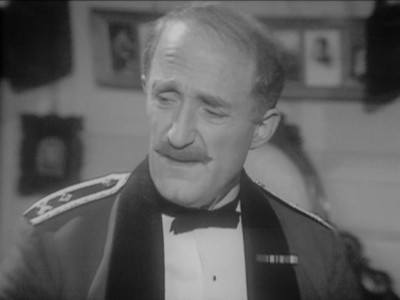
Looking at the complex former lieutenant-general in the British Army and founder of the Boy Scouts, Baden-Powell is an evocative (but perhaps fuzzy) meditation on the hero of the Mafeking Siege (in the Second Boer War) who, after retiring from the Army and seeing hoards of young English boys in poor health and with no moral, patriotic compass, decided to create the Boy Scouts. Initially formed as almost a paramilitary outfit (B-S, as he was known, wanted English youth prepared to defend their homeland in case of war), the Boy Scouts incorporated B-S' love of woodcraft, of "scouting," that he learned as a boy, an interaction and congress with nature he felt was the main influence on who he was as a man, and an experience that all boys should share.
Baden-Powell, a political and psychological take on the man, seems to want to suggest - through the disapproving character of journalist Angus Hamilton (Keith Barron) - that B-S was haunted by his experiences as the "savior of the Mafeking Siege" (the film suggests B-S orchestrated the siege for his own glory, and in service of "empire"), and that he formed the Boy Scouts to regain the innocence of his boyhood sojourns in the woods, when his woodcraft was a harmless outlet for juvenile fantasies of war-making. Which of course is ironic, when one considers these early "harmless" scouting experiences probably led to his being an extraordinarily gifted solider in the field. Decidedly anti-empire from the Hamilton standpoint (but fuzzily vague as to B-S' ennui experienced after his retirement from the Army), Baden-Powell may or may not be historically accurate (I'm no expert on that particular history), but it is intriguing...if somewhat compromised by not getting at the root of B-S' obviously troubled emotions. Ron Moody is particularly good as B-S; another unlikely performance from this terrific actor.
THE RELUCTANT JUGGLER
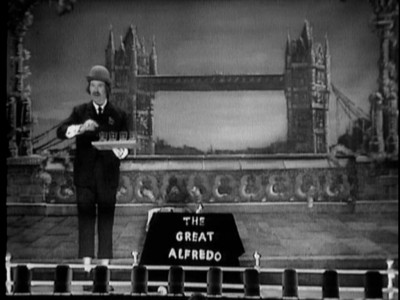
Taking a rather oblique view of the famous 1907 "Music Hall War," The Reluctant Juggler focuses on a fictional (I believe) juggler who is identified only as "The Great Alfredo" who goes through a night of indecision as more famous (and true-life) music hall headliners such as Marie Lloyd (Georgia Brown), Gus Elen (George Sewell), Charles Coburn (Peter Pratt), Vesta Victoria (Jo Kendall), and George Formby, Sr. (Gerald Moon), try to persuade him to join the impending strike. While I was familiar with a very sketchy background on English music hall traditions, I had never heard of the "Music Hall War" of 1907. The Reluctant Juggler is easy enough to follow on its own; it's a carefully crafted little one-act play that features quite a few recreations of classic English music halls numbers by the talented cast. And anyone can follow what the film is trying to say, in general terms, about workers, employers, labor and strikes. But if I hadn't looked up more details about the actual strike on-line, I doubt I would gotten much historical resonance out of the playlet. Absolutely no background whatsoever about the performers or the actual strike is given (which, admittedly, probably isn't necessary for the English audience this film was intended for), so without a score card, the film can be a little distant. Still, it's a well-mounted piece (the recreated musical numbers are charming counterpoints to the deadly-serious discussions about strikes), and the performers are first-rate.
DAISY
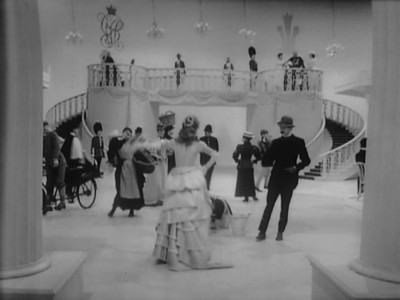
Detailing the many affairs and scandals of her tumultuous life, Daisy looks at Francis Evelyn "Daisy" Greville, the Countess of Warwick (Virginia McKenna), who among other notable liaisons during her marriage to Lord Brooke, became the mistress of King Edward VII (Thorley Walters) - while at the same time having a true love affair with Lord Charles Beresford (Myles Hoyle). As was common practice during the Edwardian Age (and indeed, in previous eras of English history, as well), a married socialite wife like Daisy Greville was often encouraged into adulterous affairs with powerful men like the King or Lord Beresford to help promote her own husband's career. But once engaged in a relationship with the King, it was unwise to see other men, and Daisy's love affair with Beresford caused tension within the court. Daisy's penchant for discussing her affairs also didn't help matters, and a later attempt to blackmail Edward's son, George the Fifth, backfired, leaving her closed out of high society.
Daisy is easily the worst episode of The Edwardians miniseries. Frequently designed to look like a stage musical (complete with stylized sets and performers jumping around and throwing their hands in the air), Daisy utterly fails to engage the viewer in the "plight" of its lead, with a thoroughly irritating performance by Virginia McKenna not helping matters at all. I was willing to go along with the parodistic bent of Daisy's structure at the beginning, but by the time the Greek chorus of Cockney chimney sweeps (right out of Mary Poppins) started singing little asides to the main action, I dug my heels in and cried, "Whoa!" Perhaps the drastic stylistic difference in Daisy, next to the other dramas in The Edwardians, caused an unfair comparison, but throughout its protracted screenplay, one doesn't get anymore accustomed to its production design, than one does with the performances, which are both overdrawn and surprisingly irritating. Easily the worst entry here in The Edwardians miniseries.
LLOYD GEORGE
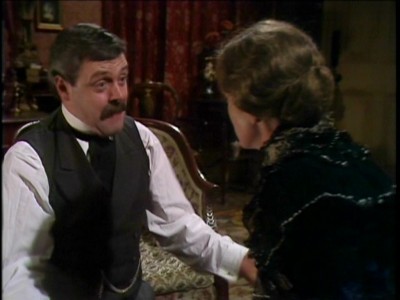
Lloyd George looks at the personal and political life of David Lloyd George (Anthony Hopkins), as the rising Liberal Member of Parliament becomes the President of the Board of Trade, and negotiates England out of a potentially disastrous railway strike. This triumph for the young politician was negated (in his personal life) by the tragic death of his daughter Mair (Joanna David) due to appendicitis, and the continued strife with his wife, Margaret (Annette Crosbie), who was heartbroken over his various affairs, as well as his son, Richard (David Troughton), who also hated his father's dalliances (in fact, Richard caught his father in bed with a girl Richard fancied, on a trip to the Riviera).
Lloyd George is of two minds when it comes to its drama: political and personal. And while both elements, separately, are handled well, the cutting back and forth between the two in Keith Dewhurst's screenplay tends not to amplify each in relation to the other, but diminish. Just when I was becoming involved in George's personal life, a political scene would interrupt, and thus, back and forth. For a playlet running only about 70 minutes, Lloyd George tries for too much in chronicling both George's personal and political career, eventually coming up short on both. As for Hopkins' performance, the ubiquitous Welsh actor's mannerisms have become the stuff of parody by now, so watching a performance early in his career is fascinating, particularly when you see he's pretty much locked down "the standard Anthony Hopkins performance" by 1972. Your tolerance for his emoting will determine whether or not you believe he's successful here (the twitching and the explosive twittering about has always been a bit much for me).
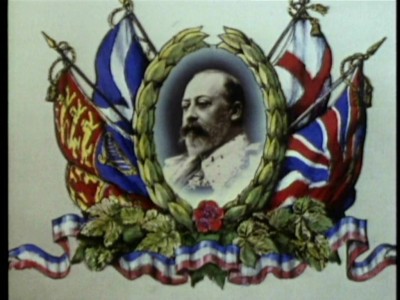
The DVD:
The Video:
Curiously, the first and last episodes of The Edwardians (Mr. Rolls and Mr. Royce and Lloyd George) are presented here in their original color video transfers, while the remaining episodes are black and white tape copies (or kinescopes). The back of the box incorrectly states that only Lloyd George was filmed in color (obviously, Mr. Rolls is also in color), but there's no other information on the black and white episodes. With that said, the full-frame, 1.33:1 video transfers for The Edwardians are about what you'd expect from source materials from an English TV program from the earlier 1970s: plenty of video noise, some ghosting, some bleeding, and with the black and white episodes, some high contrast. However, for these types of shows, the video fidelity is secondary to the performances and the writing, so anyone used to these kinds of shows from this period, won't blink twice at the look of The Edwardians.
The Audio:
The Dolby Digital English mono audio track has its share of warbles and varying loudness levels, but again, most of the dialogue is cleanly delineated, and there are, thankfully, subtitles for any local accents that get a bit thick.
The Extras:
There are no extras for The Edwardians.
Final Thoughts:
Quite an intriguing collection of short playlets, The Edwardians gathers together eight 70-minute TV dramas chronicling a handful of the influential figures that graced the Edwardian period. Most of the episodes in this 1972 miniseries are quite well done, and should appeal to casual history buffs and fans of vintage British TV. I highly recommend The Edwardians.
Paul Mavis is an internationally published film and television historian, a member of the Online Film Critics Society, and the author of The Espionage Filmography.


|
| Popular Reviews |
| Sponsored Links |
|
|
| Sponsored Links |
|
|
| Release List | Reviews | Shop | Newsletter | Forum | DVD Giveaways | Blu-Ray | Advertise |
|
Copyright 2024 DVDTalk.com All Rights Reserved. Legal Info, Privacy Policy, Terms of Use,
Manage Preferences,
Your Privacy Choices | |||||||









